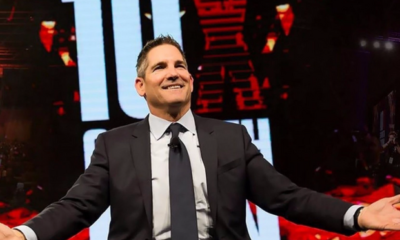Success Advice
8 Ways to L.E.V.E.R.A.G.E Your Story and Make Your Book Your New Business Card

“I should write a book,” is something that every single person says to themselves at one point or another. Then, on the occasion that a family member, friend or mentee echo’s the statement, we decide to commit and dive into the process of translating our powerful story into the pages of a book. But here’s the thing, although “Just write” is a widely shared piece of advice for those bold enough to take action to go from idea to finished book, that advice will leave your book collecting dust on virtual shelves and not generating the revenue you envision for your message.
I’ve worked with a number of authors with different messages, and in addition to helping them each understand that a book is a conversation, I helped them each navigate the process that positioned their book for leverage resulting in global impact and profits.
Here are the 8 keys to writing a book that does ALL things from increased visibility and global impact to generating 6 figure profits:
1. Launch your book to an audience that’s already engaged and awaiting its arrival
Writing your book in secret then springing it on your audience is a recipe for disaster because it doesn’t include them in the creation process. Take the time to develop a release strategy that builds your list, includes launch partners, keeps the release timeline in the forefront of the readers mind, and correlates with the offering of a product or service that you provide. Planning a true launch strategy, though different from the “if you build it they will come” approach, can generate book sales, income from speaking, course sales, coaching clients, revenue from consulting and more.
2. Engage your dream reader in the conversation as early as possible
If you’re waiting until your book is done to start promoting, you’re late! There are 3 phases of promotions that you need to tap into to get and maintain momentum with your audience. Each phase is important because it allows your tribe to get “invested” mentally and emotionally BEFORE they make the shift to financial investment. Business and sales experts teach that it takes “7 touches” before a person decides to invest in a product or service financially, this is why funnels are so effective, and the same rules apply to the promotion of your book.
3. Validate the conversation
We already know that a book is a conversation, but before you dive right into sharing all of your brilliant awesomeness, you want to make sure that it is a conversation that your audience or desired audience wants to have with you. In the business world this is called good old market research, and social media has totally changed market research allowing you to get real-time feedback in the form of likes and engagement.
This is a great thing for business owners and authors alike. By doing this foundational research, there is the added benefit of having the start of a great reader profile which is a major indicator of what your book should focus on as well as a way to clarify what programs or offerings your audience needs resulting in more effective prospect/lead generation, increased sales conversions, sold out program offerings, and increased income.
4. Educate your reader
Don’t just tell your life story and drop the mic (or the pen in this instance), make your book a “teach all” and really help readers to identify and apply the nuggets you’ve learned on your journey. This holds true no matter the conversation topic of your book because when you really focus on what the reader needs from you versus what you want to say, you become a trusted, credible authority to the reader. All of which is necessary to convert readers and fans into paying clients, referral partners, and your walking marketing and PR team.
5. Research the language that your dream readers use around the conversation topic
It’s important to know what words your tribe and potential readers are using to describe their pain points. One example I love to use to explain this is a doctor’s visit. When you go to the doctor with an issue, you describe the symptom you are experiencing, and then the doctor gives you the clinical diagnosis. This is exactly how keywords work.
So whatever your conversation topic is, you want to make sure you are using the language that your audience uses so they know and understand that you are providing the solution they are looking for. If you do not determine the language of your audience, the audience will not connect to your message and book. Once you are clear on the language, you can strengthen your copy and the messaging in your book again increasing the “know, like and trust” factor as well as sales and income possibility.
6. Accelerate the reader’s engagement and participation in the conversation
You can do this by providing them with practical application steps, homework, and CTA’s in the form of dynamic QR Codes that prompt them to take action throughout your book. Never take for granted that the readers were able to identify the nuggets, perspective or lessons as you share your story. Always, always, always tell them what you’re going to teach them, tell them what you taught them, AND tell them what to do with what you taught them. Providing next steps or homework, makes your book a go-to resource to facilitate the change your readers have been dreaming of, and that converts them to clients.
7. Guide the conversation
Guide the reader from their current point of awareness to some level of transformation. Avoid filling your book with fluff and teasers because this will only damage the reader’s trust of you as a credible authority. Rest assured, you can never share too much because YOU are still the secret sauce that gets people results.
8. Extend the invitation to further tap into your expertise
When readers come to your book, they are aware that there is an issue, when you position your book and message to get them results your authority, and proof of work grows real time. While you have the reader engaged, invite them to connect with you in a more in-depth way. This can be providing your email address, inviting them to a call, or giving them special access to digital products and other offerings. This takes your ability to share your message, serve others, and generate income further than just book sales.
Writing a book you can leverage is a part of the writing and publishing process that means the difference in using your book to elevate your business, brand and message or giving away your book to friends and family for every birthday or holiday. It is absolutely possible to write a book that proves more powerful in generating leads than webinars, and positions you as an expert, more than business cards can. These steps ensure that your book is not only done and delivered to the people who need it the most, but it positions you for exposure and multiple streams of income.
Business
The Simple Security Stack Every Online Business Needs
Most small businesses are exposed online without realising it. This simple protection stack keeps costs low and risks lower.

Running a business online brings speed and reach, but it also brings risk. Data moves fast. Payments travel across borders. Teams log in from homes, cafés, and airports. (more…)
Business
If Your Business Internet Keeps Letting You Down, Read This
From smoother operations to better security, dedicated internet access is quietly powering today’s high-performing businesses.

Today, a dependable internet service is the bedrock for uninterrupted business operations. Many organizations rely on stable online connections for communication, data transfer, and customer interaction. (more…)
Did You Know
How Skilled Migrants Are Building Successful Careers After Moving Countries
Behind every successful skilled migrant career is a mix of resilience, strategy, and navigating systems built for locals.

Moving to a new country for work is exciting, but it can also be unnerving. Skilled migrants leave behind familiar systems, networks, and support to pursue better job opportunities and a better future for their families. (more…)
-

 Health & Fitness2 weeks ago
Health & Fitness2 weeks agoWhat Minimalism Actually Means for Your Wellness Choices
-

 News1 week ago
News1 week agoBrandon Willington Builds 7-Figure Business by Ignoring Almost Everything
-

 Did You Know2 weeks ago
Did You Know2 weeks agoWhy Most Online Courses Fail and How to Fix Them
-

 Business2 weeks ago
Business2 weeks agoIf Your Business Internet Keeps Letting You Down, Read This
-

 Business3 days ago
Business3 days agoEntrepreneur’s Guide to Pay Stubs: Why Freelancers and Small Business Owners Need a Smart Generator
-

 Business1 day ago
Business1 day agoThe Simple Security Stack Every Online Business Needs
-

 Finances1 day ago
Finances1 day agoWhy Financial Stress Is One of the Biggest Barriers to Personal Growth
-

 Scale Your Business17 hours ago
Scale Your Business17 hours ago5 Real Ways to Grow Your User Base Fast

























